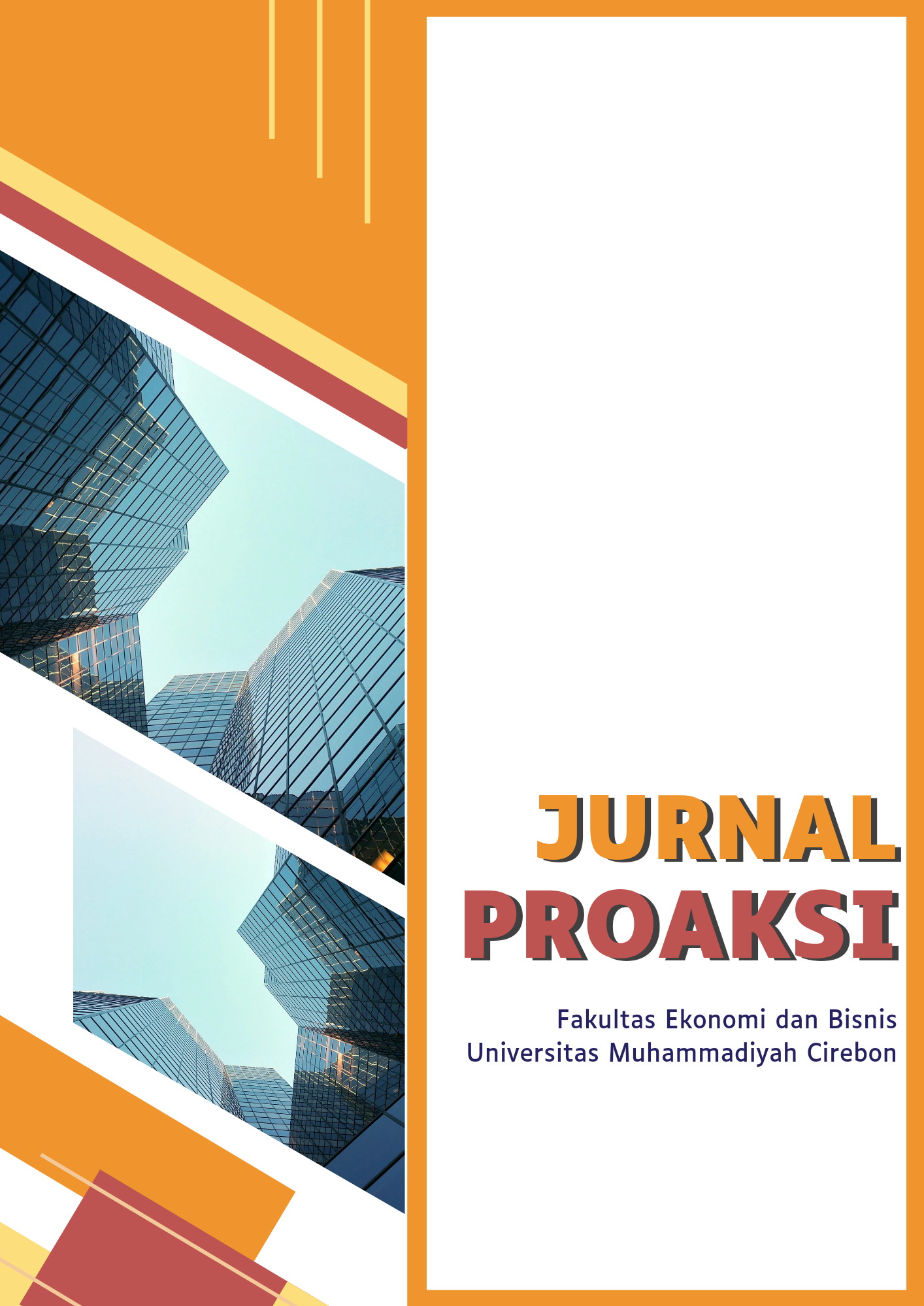CSR and Financial Fraud: Board Gender and Audit Committee Expertise as Moderating
DOI:
https://doi.org/10.32534/jpk.v11i4.6515Keywords:
Audit Committee, Board Gender, CSR, FraudAbstract
Financial statement fraud negatively impacts for the company, both materially and immaterially, including reduced stakeholders trust. The highlights the need for transparency through CSR reports. CSR represent the company’s transparency and reduce fraud. However, oportunistic managers may exploit CSR as a tool to conceal fraudulent actions. This study aimed to analyze the relationship between CSR disclosure and financial statement fraud, as well as the moderating effects of gender diversity on boards of commissioners and committee expertise. This study is a quantitative approach with a population of state-owned companies listed on IDX from 2019 to 2023. The sampling technique was purposive sampling, which resulted in 20 companies. The analysis methods were panel data logistic regression and MRA using the Eviews 12 software. The results indicated that CSR disclosure positively influences financial statement fraud. Gender diversity on the board does not moderate this relationship, while audit committee with financial expertise weakens the relationship between CSR disclosure and financial statement fraud. The findings contribute to agency theory and provide practical implications for companies and investors in identifying potential fraud related to CSR activities. The novelty of this research is the addition of two moderating variables.
Downloads
References
ACFE. (2024). Occupational Fraud 2024: A Report to the Nations. https://legacy.acfe.com/report-to-the-nations/2024/
Adams, R. B. (2016). Women on boards: The superheroes of tomorrow? Leadership Quarterly, 27(3), 371–386. https://doi.org/10.1016/j.leaqua.2015.11.001
Aghghaleh, S. F., Mohamed, Z. M., & Rahmat, M. M. (2016). Detecting Financial Statement Frauds in Malaysia: Comparing the Abilities of Beneish and Dechow Models. Asian Journal of Accounting and Governance, 7(2016), 57–65. https://doi.org/10.17576/ajag-2016-07-05
Aguilera, R. V, Filatotchev, I., Gospel, H., & Jackson, G. (2007). An Organizational Approach to Comparative Corporate Governance: Costs, Contigenties, and Complementarities. 19(3), 475-492. http://dx.doi.org/10.2139/ssrn.955043
Ahmad, G., Hayat, F., Almaqtari, F. A., Farhan, N. H. S., & Shahid, M. (2023). Corporate social responsibility spending and earnings management: The moderating effect of ownership structure. Journal of Cleaner Production, 384(january). https://doi.org/10.1016/j.jclepro.2022.135556
Alexander, N., & Palupi, A. (2020). Pengaruh Corporate Social Responsibility Reporting terhadap Manajemen Laba 22(Issue 1). http://jurnaltsm.id/index.php/JBA
Arayssi, M., Dah, M., & Jizi, M. (2016). Women on boards, sustainability reporting and firm performance. Sustainability Accounting, Management and Policy Journal, 7(3), 376–401. https://doi.org/10.1108/SAMPJ-07-2015-0055
Arum, E. D. P., Wijaya, R., Wahyudi, I., & Brilliant, A. B. (2023). Corporate Governance and Financial Statement Fraud during the COVID-19: Study of Companies under Special Monitoring in Indonesia. Journal of Risk and Financial Management, 16(7), 318. https://doi.org/10.3390/jrfm16070318
Ashma’, F. U., & Laksmi, A. C. (2023). Corporate Social Responsibility dan Stabilitas Keuangan terhadap Financial Fraud: Peran Moderasi dari Kualitas Audit. Reviu Akuntansi Dan Bisnis Indonesia, 7(1), 134–152. https://doi.org/10.18196/rabin.v7i1.17739
Bacha, S., & Ajina, A. (2020). CSR performance and annual report readability: evidence from France. Corporate Governance (Bingley), 20(2), 201–215. https://doi.org/10.1108/CG-02-2019-0060
Barnhart, S. W., & Rosenstein, S. (1998). The Financial Review 33(Issue4), 1-16. https://onlinelibrary.wiley.com/doi/abs/10.1111/j.1540-6288.1998.tb01393.x
Beneish, M. D. (1999). The Detection of Earnings Manipulation. Financial Analysis Journal, 55(5), 24–36. http://dx.doi.org/10.2469/faj.v55.n5.2296
Binekasri, R. (2023). Soal Dugaan Laporan Keuangan WSKT Dipoles, OJK Buka Suara. Www.Cnbcindonesia.Com.
Bosquet, K., De Goeij, P., & Smedts, K. (2014). Gender heterogeneity in the sell-side analyst recommendation issuing process. Finance Research Letters, 11(2), 104–111. https://doi.org/10.1016/j.frl.2013.11.004
Buertey, S., Sun, E. J., Lee, J. S., & Hwang, J. (2020). Corporate social responsibility and earnings management: The moderating effect of corporate governance mechanisms. Corporate Social Responsibility and Environmental Management, 27(1), 256–271. https://doi.org/10.1002/csr.1803
Carroll, A. B. (1979). A Three-Dimensional Conceptual Model of Corporate Performance. In Source: The Academy of Management Review 4(Issue4), 497-505. https://www.jstor.org/stable/257850
Chu, S., Oldford, E., & Wang, J. (2023). Corporate social responsibility and corporate fraud in China: The perspective of moderating effect of board gender diversity. International Review of Economics and Finance, 88, 1582–1601. https://doi.org/10.1016/j.iref.2023.07.062
Conyon, M. J., & He, L. (2016). Executive Compensation and Corporate Fraud in China. Journal of Business Ethics, 134(4), 669–691. https://doi.org/10.1007/s10551-014-2390-6
Dissanayake, S., Ajward, R., & Dissanayake, D. (2023). Whether corporate social responsibility is used to suppress earnings management practices and could corporate governance mechanisms prevent them? An empirical study. Asian Journal of Accounting Research, 8(4), 373–386. https://doi.org/10.1108/AJAR-03-2022-0086
Fitroni, N. A., & Feliana, Y. K. (2022). Pengaruh Keberagaman Gender Pada Dewan Komisaris, Dewan Direksi, dan Komite Audit Terhadap Manajemen Laba. Akuntansi Dan Teknologi Informasi, 15(1), 8–21. https://doi.org/10.24123/jati.v15i1.4575
Gaio, C., Gonçalves, T., & Sousa, M. V. (2022). Does corporate social responsibility mitigate earnings management? Management Decision, 60(11), 2972–2989. https://doi.org/10.1108/MD-05-2021-0719
Gargouri, R. M., Shabou, R., & Francoeur, C. (2010). The relationship between corporate social performance and earnings management. Canadian Journal of Administrative Sciences, 27(4), 320–334. https://doi.org/10.1002/cjas.178
Ghaleb, B. A. A., Qaderi, S. A., Almashaqbeh, A., & Qasem, A. (2021). Corporate social responsibility, board gender diversity and real earnings management: The case of Jordan. Cogent Business and Management, 8(1). https://doi.org/10.1080/23311975.2021.1883222
Ghozali, I. (2018). Aplikasi Analisis Multivariate Dengan Program IBM SPSS 25 (8th ed.). Badan Penerbit Universitas Diponegoro. https://scholar.google.com/citations?view_op=view_citation&hl=en&user=kbmkIQQAAAAJ&citation_for_view=kbmkIQQAAAAJ:XeErXHja3Z8C
Gras-Gil, E., Palacios Manzano, M., & Hernández Fernández, J. (2016). Investigating the relationship between corporate social responsibility and earnings management: Evidence from Spain. BRQ Business Research Quarterly, 19(4), 289–299. https://doi.org/10.1016/j.brq.2016.02.002
Habbash, M., & Haddad, L. (2020). The impact of corporate social responsibility on earnings management practices: evidence from Saudi Arabia. Social Responsibility Journal, 16(8), 1073–1085. https://doi.org/10.1108/SRJ-09-2018-0232
Haniffa, R. M., & Cooke, T. E. (2005). The impact of culture and governance on corporate social reporting. Journal of Accounting and Public Policy, 24(5), 391–430. https://doi.org/10.1016/j.jaccpubpol.2005.06.001
Hu, H., Dou, B., & Wang, A. (2019). Corporate social responsibility information disclosure and corporate fraud-"risk reduction" effect or “window dressing” effect? Sustainability (Switzerland), 11(4), 1141. https://doi.org/10.3390/su11041141
Jensen, M. C., & Meckling, W. H. (1976). Theory of the Firm: Managerial Behavior, Agency Costs and Ownership Structure. In Journal of Financial Economics 3(Issue 4), 305-360. https://doi.org/10.1016/0304-405X(76)90026-X
Kaituko, L. E., Githaiga, P. N., & Chelogoi, S. K. (2023). Board structure and the likelihood of financial statement fraud. Does audit fee matter? Evidence from manufacturing firms in the East Africa community. Cogent Business and Management, 10(2). https://doi.org/10.1080/23311975.2023.2218175
Kalbuana, N., Utami, S., & Pratama, A. (2020). Pengaruh Pengungkapan Corporate Social Responsibility, Persistensi Laba dan Pertumbuhan Laba Terhadap Manajemen Laba Pada Perusaaan Yang Terdaftar di Jakarta Islamic Index. Jurnal Ilmiah Ekonomi Islam, 6(2), 350. https://doi.org/10.29040/jiei.v6i2.1107
Kumala, R., & Siregar, S. V. (2021). Corporate social responsibility, family ownership and earnings management: the case of Indonesia. Social Responsibility Journal, 17(1), 69–86. https://doi.org/10.1108/SRJ-09-2016-0156
Kuo, Y. F., Lin, Y. M., & Chien, H. F. (2021). Corporate social responsibility, enterprise risk management, and real earnings management: Evidence from managerial confidence. Finance Research Letters, 41. https://doi.org/10.1016/j.frl.2020.101805
Larasati, M. D., & Az’mi, Y. U. (2023). Pengungkapan Corporate Social Responsisbility dan Manajemen Laba Dengan Board Gender Diversity Sebagai Variabel Moderasi. E-Jurnal Akuntansi, 33(2), 331-345. https://doi.org/10.24843/eja.2023.v33.i02.p04
Larasati, T., Wijayanti, A., & Maulana, A. (2020). Keahlian Keuangan Komite Audit dalam Memoderasi Fraud Triangle Terhadap Kecurangan Laporan Keuangan. Jurnal Syntax Transformation, 1(8), 541–553. http://dx.doi.org/10.46799/jst.v1i8.128
Laufer, W. S. (2003). Social Accountability and Corporate Greenwashing. In Source: Journal of Business Ethics 43(3), 253-261. https://www.jstor.org/stable/25074996
Leuz, C., Nanda, D., & Wysocki, P. D. (2003). Earnings management and investor protection: An international comparison. Journal of Financial Economics, 69(3), 505–527. https://doi.org/10.1016/S0304-405X(03)00121-1
Li, X., Kim, J. B., Wu, H., & Yu, Y. (2021). Corporate Social Responsibility and Financial Fraud: The Moderating Effects of Governance and Religiosity. Journal of Business Ethics, 170(3), 557–576. https://doi.org/10.1007/s10551-019-04378-3
Liao, L., Chen, G., & Zheng, D. (2019). Corporate social responsibility and financial fraud: evidence from China. Accounting and Finance, 59(5), 3133–3169. https://doi.org/10.1111/acfi.12572
Lu, C., Zhao, X., & Dai, J. (2018). Corporate social responsibility and insider trading: Evidence from China. Sustainability (Switzerland), 10(9). https://doi.org/10.3390/su10093163
Maulidi, A. (2023). Gender board diversity and corporate fraud: empirical evidence from US companies. Journal of Financial Crime, 30(2), 309–331. https://doi.org/10.1108/JFC-02-2022-0038
McLaughlin, C., Armstrong, S., Moustafa, M. W., & Elamer, A. A. (2021). Audit committee diversity and corporate scandals: evidence from the UK. International Journal of Accounting and Information Management, 29(5), 734–763. https://doi.org/10.1108/IJAIM-01-2021-0024
Mousavi, M., Zimon, G., Salehi, M., & St?pnicka, N. (2022). The Effect of Corporate Governance Structure on Fraud and Money Laundering. Risks, 10(9). https://doi.org/10.3390/risks10090176
Mubarokah, R. M., & Agustia, D. (2020). Effect of Corporate Social Responsibility (CSR) Disclosure to Earnings Management with Effectiveness of the Audit Committee as a Moderation Variable. In International Journal of Innovation, Creativity and Change. 10(12), 392-406. www.ijicc.net
Muttakin, M. B., Khan, A., & Subramaniam, N. (2015). Firm characteristics, board diversity and corporate social responsibility: Evidence from Bangladesh. Pacific Accounting Review, 27(3), 353–372. https://doi.org/10.1108/PAR-01-2013-0007
Otoritas Jasa Keuangan Republik Indonesia. (2015). Peraturan Otoritas Jasa Keuangan Nomor 55/POJK.04/2015-Pembentukan dan Pedoman Pelaksanaan Kerja Komite Audit. 1–14. https://peraturan.bpk.go.id/Details/128761/peraturan-ojk-no-55-pojk042015-tahun-2015
Porter, M. E., & Kramer, M. R. (2002). The Competitive Advantage of Corporate Philantropy. Harvard Business Review, 80(12), 56-68. https://www.researchgate.net/publication/10965149_The_Competitive_Advantage_of_Corporate_Philanthropy
Pratiwi, H. R. (2019). Membedah Keanehan Laporan Keuangan Garuda Indonesia 2018. CNN Indonesia. https://www.cnnindonesia.com/ekonomi/20190430174733-92-390927/kronologi-kisruh-laporan-keuangan-garuda-indonesia
Rahman, M. J., & Zheng, X. (2023). Whether family ownership affects the relationship between CSR and EM: evidence from Chinese listed firms. Journal of Family Business Management, 13(2), 373–386. https://doi.org/10.1108/JFBM-03-2022-0030
Razak, B., & Helmy, H. (2020). Pengaruh Dewan Direksi Wanita, Dewan Komisaris Wanita dan Kualitas Pengungkapan Corporate Social Responsibility Terhadap Manajemen Laba (Studi Empiris pada Perusahaan yang terdaftar di BEI dan menerbitkan Sustainable Report Tahun 2015-2018). Jurnal Eksplorasi Akuntansi, 2(4)(Seri A), 3434–3451. http://dx.doi.org/10.24036/jea.v2i4.294
Repousis, S. (2016). Using Beneish model to detect corporate financial statement fraud in Greece. Journal of Financial Crime, 23(4), 1063–1073. https://doi.org/10.1108/JFC-11-2014-0055
Thoomaszen, S. P., & Hidayat, W. (2020). Keberagaman Gender Dewan Komisaris dan Direksi terhadap Kinerja Perusahaan. E-Jurnal Akuntansi, 30(8), 2040-2052. https://doi.org/10.24843/eja.2020.v30.i08.p11
Tran, N. M., Tran, M. H., & Phan, T. D. (2022). Corporate social responsibility and earning management: Evidence from listed Vietnamese companies. Cogent Business and Management, 9(1). https://doi.org/10.1080/23311975.2022.2114303
Trihermanto, F., & Nainggolan, Y. A. (2020). Corporate life cycle, CSR, and dividend policy: empirical evidence of Indonesian listed firms. Social Responsibility Journal, 16(2), 159–178. https://doi.org/10.1108/SRJ-09-2017-0186
Wang, Y., Tai, P., & Pang, M. (2024). Corporate social responsibility and corporate fraud: The mediating effect of analyst attention. Finance Research Letters, 64. https://doi.org/10.1016/j.frl.2024.105370
Wang, Y., Yu, M., & Gao, S. (2022). Gender diversity and financial statement fraud. Journal of Accounting and Public Policy, 41(2). https://doi.org/10.1016/j.jaccpubpol.2021.106903
Zadeh, F. N., Askarany, D., Shirzad, A., & Faghani, M. (2023). Audit committee features and earnings management. Heliyon, 9(10). https://doi.org/10.1016/j.heliyon.2023.e20825
Zalata, A. M., Ntim, C. G., Alsohagy, M. H., & Malagila, J. (2022). Gender diversity and earnings management: the case of female directors with financial background. Review of Quantitative Finance and Accounting, 58(1), 101–136. https://doi.org/10.1007/s11156-021-00991-4
Downloads
Published
Issue
Section
License
Copyright (c) 2024 Ofii Fatul Lathiifah, Fuad Fuad

This work is licensed under a Creative Commons Attribution 4.0 International License.




















